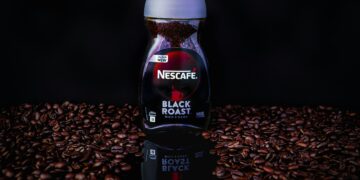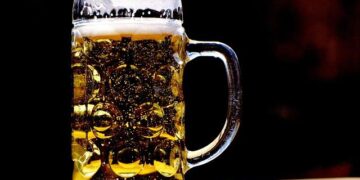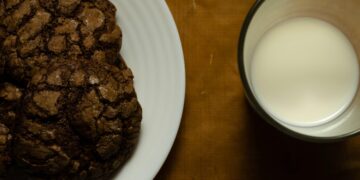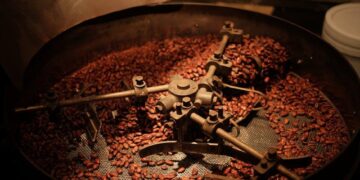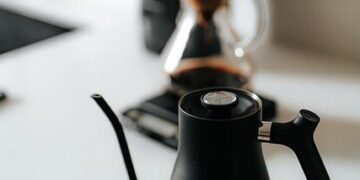Table of Contents
As a nutrition researcher, I live by the numbers.
For years, I’ve helped people navigate the complex world of food labels and macronutrients.
So, when I set a personal health goal for myself, I approached it with the same clinical precision.
I tracked every gram, logged every meal, and calculated every calorie.
Yet, for weeks, my progress completely stalled.
I was mystified and, frankly, embarrassed.
The culprit, I suspected, was my one daily indulgence: a grande cappuccino from my local coffee shop.
I’d dutifully logged it as 140 calories, the number plastered on the menu board and official website.1
It was a constant, a reliable data point in my otherwise variable day.
Or so I thought.
The frustration was immense.
I was following the rules, using the very data provided to me, yet the equation wasn’t adding up.
This wasn’t just about a few stubborn pounds; it was about a fundamental breakdown in trust between the consumer and the information we’re given.
It sent me down a rabbit hole, not just as a researcher, but as a frustrated customer.
If a simple cappuccino isn’t 140 calories, then what is it? More importantly, how can any of us ever be sure what we’re consuming when the numbers themselves seem to be a moving target? My personal struggle became a professional investigation, and what I uncovered was a system of nutritional reporting that is fundamentally broken for customizable drinks.
But in that chaos, I found a new way forward—a framework that puts the power back into your hands.
The Anatomy of a Deception: Why a “Cappuccino” Is Never Just a Cappuccino
My first step was to understand the landscape of information a typical consumer faces.
It was worse than I imagined.
The idea of a “standard cappuccino” is a complete illusion.
One source confidently states a “typical” cappuccino is 150 calories.3
Another narrows it down to a range of 120-150 calories for a small 150 ml cup.4
The ubiquitous Starbucks Grande is listed at 140 calories on its main page but 120 calories in a media comparison.2
A small cappuccino at one shop might be 80 calories, while at another, it could be double that at 160.6
This isn’t a rounding error; it’s chaos.
The reason for this disparity is that a cappuccino isn’t a static, pre-packaged product.
It’s a dynamic recipe assembled on the fly, and its final calorie count is a function of three core, often unstated, variables: the type of milk used, the total size and volume of the drink, and any add-ins like sugars or syrups.
The single number you see on a menu board is an attempt to apply a rigid labeling system, designed for a can of soda, to a fluid and customizable reality.
This creates what I call the “Calorie Mirage”—a number that appears solid and reliable but is an illusion based on a single “default” recipe (e.g., a 16 oz size with 2% milk and no sugar) that may not reflect what you actually order or what the barista even prepares.2
This systemic flaw isn’t your fault; it’s a failure of the system to communicate honestly about customizable products, and it’s the reason so many of us feel confused and misled.
The Epiphany: Your Coffee Isn’t a Product, It’s a Personal Calorie Budget
For weeks, I was trapped in the old way of thinking, trying to find the single “right” number.
The breakthrough came when I realized I was asking the wrong question.
The question wasn’t “How many calories are in a cappuccino?” The real question was “How do I build a cappuccino that fits my goals?” I had to stop seeing my coffee as a fixed item on a menu and start seeing it as a system I could design and control.
This led me to reframe the entire concept using an analogy that changed everything: ordering a cappuccino is like managing a mini-budget.
- Fixed Costs (The Base): This is your foundation—the shot or two of espresso. It’s a non-negotiable part of the drink, but its cost is negligible, contributing only 5 to 10 calories.3
- Core Investment (The Milk): This is the largest and most significant expenditure in your coffee budget. Your choice of milk is the single biggest decision that will determine the final caloric “price” of your drink.
- Discretionary Spending (The Add-Ins): These are the optional luxuries—syrups, sugars, and toppings. They can be small, manageable expenses or they can be budget-busters that completely derail your plans.
This mental model is incredibly empowering.
It shifts you from being a passive recipient of a mysterious product to an active architect of your own beverage.
It replaces confusion with a clear, actionable decision-making process.
You are no longer a victim of the Calorie Mirage; you are the budget manager.
Building Your Budget, Part 1: The Milk Portfolio (Your Core Investment)
The vast majority of a cappuccino’s calories come from its largest component: milk.
The fat and natural sugars (lactose) in milk are what drive the numbers up.3
Therefore, your choice of milk is the most critical decision in managing your coffee’s calorie budget.
To make an informed choice, you need a clear ledger of your options.
The “Foam Discount” is a crucial strategic element to understand here.
A traditional cappuccino is defined by its balanced structure of roughly one-third espresso, one-third steamed milk, and one-third milk foam.9
A latte, by contrast, is almost all steamed milk with just a thin layer of foam on top.10
Since milk foam is mostly air, and air has zero calories, a cappuccino contains significantly less liquid milk than a latte of the same cup size.
This means a cappuccino will almost always have fewer calories than a latte made with the same milk, often by a substantial margin.11
This reframes the cappuccino not just as a textural preference but as a savvy caloric strategy—it delivers a rich, milky coffee experience for a lower calorie cost.
To help you manage this core investment, the following table consolidates data from numerous sources into a single, comprehensive guide.
Table 1: The Ultimate Milk Calorie Guide for Coffee Lovers (per 8 oz / ~240 ml)
| Milk Type | Estimated Calories | Total Fat (g) | Total Sugars (g) | Key Data Sources |
| Whole Milk | 150 | 8 | 12 | 9 |
| 2% Milk (Semi-Skimmed) | 120-130 | 5 | 12 | 9 |
| Skim Milk (Non-Fat) | 80-90 | 0 | 12-13 | 9 |
| Oat Milk | 120-180 | 5-8 | 3-23 | 9 |
| Soy Milk (Unsweetened) | 80-110 | 4.5 | 1-6 | 9 |
| Almond Milk (Unsweetened) | 30-40 | 2.5 | 0-1 | 9 |
Note: Calorie and sugar content, especially for plant-based milks, can vary significantly by brand.
Oat milk is particularly variable.
Building Your Budget, Part 2: The Add-In Ledger (Discretionary Spending)
This is where hidden costs can accumulate and sabotage an otherwise well-managed budget.
Flavored syrups, sugar packets, and toppings are the “discretionary spending” that require a watchful eye.
The Syrup Pump Mystery: Solved
One of the most confusing areas is flavored syrup.
You might see a retail bottle of Starbucks syrup stating a serving of 2 tablespoons (1 fl oz) is 80 calories.15
This leads many to believe a single pump is a diet-wrecker.
However, after digging into discussions with experienced baristas, the truth is much more manageable.
The key is that a standard “hot bar” pump used for lattes and cappuccinos dispenses only about 1/4 fl oz, not the full 1 fl oz serving size listed on the retail bottle.16
This single piece of insider information is a game-changer for accurate tracking.
A standard pump of classic flavored syrup (like vanilla or caramel) adds approximately
20-25 calories and about 5 grams of sugar.
This transforms it from a budget-breaking expense into a small, predictable line item.
Auditing the Toppings
Other additions also carry a price:
- Sugar: A single packet or teaspoon of sugar adds a straightforward 16-25 calories.3
- Whipped Cream: This is a highly variable “luxury” item. Depending on the barista’s generosity and the specific recipe, a standard topping can range from 50 to over 150 calories.18 A Starbucks Grande Caffe Mocha, for instance, jumps from 260 calories to 360 with the addition of whipped cream, showcasing its significant impact.21
- Chocolate Powder: A light dusting is the most modest addition, typically contributing only 5-10 calories, but it’s important to remember it’s not zero.22
Table 2: The True Cost of Customization
| Add-In | Realistic Calorie Estimate | Key Consideration | Key Data Sources |
| 1 Pump Standard Syrup (e.g., Vanilla) | 20-25 calories | Based on a standard 1/4 fl oz hot bar pump. | 15 |
| 1 Pump Sugar-Free Syrup | 0-5 calories | A nearly “free” expense. | 16 |
| 1 Packet/Teaspoon Sugar | 16-25 calories | A simple, predictable addition. | 17 |
| Standard Whipped Cream Topping | 50-100+ calories | Highly variable based on serving size. | 18 |
| Chocolate Dusting | 5-10 calories | A minimal but accountable expense. | 22 |
Case Studies: Auditing the Big Chains with Your New Framework
Now, let’s put the Calorie Budget framework into practice by auditing the real-world menus of major coffee chains.
This demonstrates its practical power.
The Starbucks Matrix
Starbucks is an excellent case study because of its detailed nutritional information, allowing us to build a complete picture.23
The table below shows how the calorie count for the exact same drink—a Grande (16 oz) Cappuccino—changes dramatically based on your “core investment” in milk.
Table 3: Starbucks Grande (16 oz) Cappuccino – A Calorie Matrix
| Milk Choice | Final Calorie Count |
| Nonfat Milk | 80 |
| Almond Milk | 100 |
| Soy Milk | 110 |
| 2% Milk (The “Standard”) | 120 |
| Coconut Milk | 140 |
| Whole Milk | 140 |
| Oat Milk | 190 |
Data sourced from Starbucks’ official nutritional information.23
Note: Starbucks’ Blonde Roast Cappuccino with Whole Milk is 140 calories, while the standard is also 140.
Oat milk values can vary.
This matrix visually proves the thesis: your milk choice is paramount.
The “standard” 140-calorie cappuccino is just one possibility in a spectrum that ranges from a lean 80 calories to a rich 190.
A Cross-Chain Showdown
Applying this framework across different brands reveals another layer of complexity: each chain has its own “brand philosophy” that determines its default recipe.
A “medium” cappuccino is not a standard unit of measure.
A Starbucks Grande is 16 oz, while a Dunkin’ Medium is 14 oz, and a Costa “Medio” is around 12 oz.2
Furthermore, their base assumptions differ.
Starbucks defaults to 2% milk with no sugar.2
Dunkin’, however, presents a choice: a “without sugar” version is very low in calories, but their “with sugar” option more than doubles the count, suggesting sweetness is a common expectation.25
Tim Hortons’ default 16 oz cappuccino explicitly includes 11g of sugar in its 110-calorie total.27
This means you cannot simply order a “medium cappuccino” and expect a similar product.
You are stepping into a different pre-designed caloric system at each coffee shop.
Understanding this brand-specific philosophy is the final step to becoming a true coffee architect.
Table 4: Cross-Chain Comparison – The “Standard” Medium Cappuccino
| Chain | “Medium” Size (approx.) | Default Recipe & Calorie Count | Key Data Sources |
| Starbucks | 16 oz (Grande) | 2% Milk, No Sugar: 120 calories | 23 |
| Dunkin’ | 14 oz (Medium) | Skim Milk, No Sugar: ~60-80 calories | 26 |
| Dunkin’ | 14 oz (Medium) | Whole Milk, No Sugar: ~120 calories | 28 |
| Costa Coffee | 12 oz (Medio) | Skimmed Milk: ~90-115 calories | 29 |
| Tim Hortons | 16 oz | Includes 11g Sugar: 110 calories | 27 |
Conclusion: From Calorie Victim to Coffee Architect
Returning to my own story, this framework was my solution.
By deconstructing the cappuccino into its component parts, I solved the mystery of my stalled progress.
I realized my local shop used whole milk as a default, and my “140-calorie” drink was likely closer to 180.
Armed with the Calorie Budget model, I could switch to skim or almond milk, confidently track my intake, and get my health goals back on track—all without giving up my beloved daily ritual.
The power is in understanding that a cappuccino’s calorie count is not a fixed number to be discovered, but a final sum that you get to calculate.
The choice of milk is your biggest lever, the “Foam Discount” is your built-in advantage, and the add-ins are your discretionary choices.
By embracing this mindset, you can move from being a calorie victim, confused and frustrated by misleading data, to a coffee architect—capable of designing the perfect drink for your taste, your budget, and your life, with full knowledge and control.
The goal was never to fear coffee, but to understand it.
Now, you can.
Works cited
- Cappuccino: Starbucks Coffee Company, accessed August 2, 2025, https://www.starbucks.com/menu/product/409/hot
- Cappuccino: Nutrition: Starbucks Coffee Company, accessed August 2, 2025, https://www.starbucks.com/menu/product/409/hot/nutrition
- How Many Calories Are in Your Coffee? 15 Different Drinks – Hanstrom, accessed August 2, 2025, https://hanstrom.com/blog/calories-in-coffee/
- www.sunich.org, accessed August 2, 2025, https://www.sunich.org/en/blog/cappuccino-calories
- McDonald’s CosMc’s, Starbucks and Dunkin’: How do their drinks compare in calories and sugar? – CBS News, accessed August 2, 2025, https://www.cbsnews.com/news/mcdonalds-cosmcs-beverages-nutrition-sugar-calories/
- Low-Calorie Choices at Your Favorite Coffee Shops – Delishably, accessed August 2, 2025, https://delishably.com/beverages/Low-Calorie-Choices-At-Your-Favorite-Coffee-Shops
- Costa Coffee Us Cappuccino, Made With Whole Milk, Small Nutrition Facts – Eat This Much, accessed August 2, 2025, https://www.eatthismuch.com/calories/cappuccino-made-with-whole-milk-small-4547333
- Coffee: Calories & Calorie Chart, accessed August 2, 2025, https://www.calories.info/food/coffee
- Calories in coffee with milk: A comprehensive guide – FreshGround, accessed August 2, 2025, https://freshground.co.uk/learning-hub/calories-in-coffee-with-milk-a-comprehensive-guide/
- The number of calories in coffee, milk and flavourings | Details for different coffee’s, accessed August 2, 2025, https://caffin8.co.uk/blogs/coffee/the-number-of-calories-in-coffee-milk-and-flavourings-details-for-different-coffees
- Cappuccino vs Latte Calories: Decoding Your Coffee Choice, accessed August 2, 2025, https://majestycoffee.com/blogs/posts/cappuccino-vs-latte-calories
- Caffe latte vs cappuccino: Nutritional differences – January AI, accessed August 2, 2025, https://www.january.ai/blog/caffe-latte-vs-cappuccino
- Coffee Nutrition and Health: Milk Options & Nutrition – La Vita Dolce, accessed August 2, 2025, https://www.lavitadolcecafe.com/coffee-nutrition-milk/
- Skim Milk vs. 2% Milk | Emily Todhunter, WVU Graduate Dietetic Intern – WordPress.com, accessed August 2, 2025, https://emilytodhunterwvudietetics.wordpress.com/2012/08/01/skim-milk-vs-2-milk/
- Actual calories in Starbucks syrups : r/starbucks – Reddit, accessed August 2, 2025, https://www.reddit.com/r/starbucks/comments/xy23of/actual_calories_in_starbucks_syrups/
- Can someone explain this to me? How is this article saying 1 pump (1tbsp) of syrup is 10cal, when their own website says it’s 45cal/tbsp? : r/1200isplenty – Reddit, accessed August 2, 2025, https://www.reddit.com/r/1200isplenty/comments/wc6usl/can_someone_explain_this_to_me_how_is_this/
- How Many Calories in Coffee with Cream and Sugar: A Definitive Guide, accessed August 2, 2025, https://therestaurantauthority.com/blogs/guides/how-many-calories-is-coffee-with-cream-and-sugar
- Calories in Coffee Bean & Tea Leaf Whipped Cream | CalorieKing, accessed August 2, 2025, https://www.calorieking.com/us/en/foods/f/calories-in-toppings-whipped-cream/QA4IYHXdTnG1QtmhjXkqxw
- Calories in Costa Coffee Whipping Cream Topping for Drinks – Nutracheck, accessed August 2, 2025, https://www.nutracheck.com/CaloriesIn/Product/58/Costa+Coffee+Whipping+Cream+Topping+for+Drinks
- help!!!! how many calories are in an a regular splash of half and half. and how many calories are in a regular amount of whip cream on top : r/starbucks – Reddit, accessed August 2, 2025, https://www.reddit.com/r/starbucks/comments/ne26pg/help_how_many_calories_are_in_an_a_regular_splash/
- Starbucks Coffee Caffe Mocha With Whipped Cream Nutrition Facts – Eat This Much, accessed August 2, 2025, https://www.eatthismuch.com/calories/caffe-mocha-with-whipped-cream-167475
- Calories in Costa Coffee Cappuccino Dusting Topping for Drinks – Nutracheck, accessed August 2, 2025, https://www.nutracheck.co.uk/CaloriesIn/Product/68/Costa+Coffee+Cappuccino+Dusting+Topping+for+Drinks
- Cappuccino Starbucks Nutrition Facts • MyFoodDiary®, accessed August 2, 2025, https://www.myfooddiary.com/foods/search?q=cappuccino+starbucks
- How many calories in Cappuccino with semi skimmed milk M Costa – Fitatu, accessed August 2, 2025, https://www.fitatu.com/catalog/pl_PL/cappuccino-with-semi-skimmed-milk-m-costa-coffee–105391075
- Dunkin’ Donuts Cappuccino, With Sugar Nutrition Facts – Eat This Much, accessed August 2, 2025, https://www.eatthismuch.com/calories/cappuccino-with-sugar-556925
- Calories in Dunkin’ Cappuccino with skim milk, without sugar – CalorieKing, accessed August 2, 2025, https://www.calorieking.com/us/en/foods/f/calories-in-beverages-cappuccino-with-skim-milk-without-sugar/5ymRWHUuQr2sCFL_D7gTSA
- Cappuccino – Tim Hortons | Information, accessed August 2, 2025, https://timhortons.co.uk/information/8
- Calories in Cappuccino Small by Dunkin Donuts and Nutrition Facts – MyNetDiary, accessed August 2, 2025, https://www.mynetdiary.com/food/calories-in-cappuccino-small-by-dunkin-donuts-fl-oz-11017801-0.html
- Nutrition — Sustainability | Costa Coffee, accessed August 2, 2025, https://www.costa.co.uk/sustainability/nutrition
- Calories in Costa Coffee Cappuccino, with Skimmed Milk, medio – CalorieKing, accessed August 2, 2025, https://www.calorieking.com/gb/en/foods/f/calories-in-beverages-cappuccino-with-skimmed-milk-medio/2QJV-FysQqucoaZ71n6G1w

